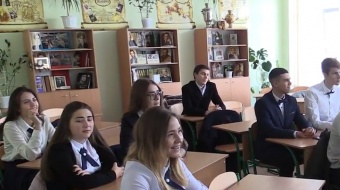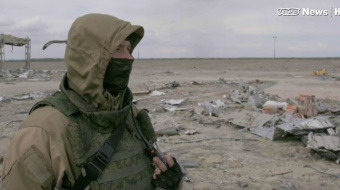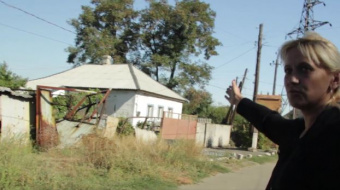25 years of separatism in Donbas: Background Part 4
25 years of separatism in Donbas: Background Part 4
25 years of separatism in Donbas: Background Part 1
25 years of separatism in Donbas: Background Part 2
25 years of separatism in Donbas: Background Part 3
Kostyantyn Skorkin, for the RN
The separatist card
Where is the position of separatists? If to take formal percentage of the ballots at the elections, the pro-Russian radicals and pure separatists are marginal. If to take into account the intellectual atmosphere and the behaviour of regional elites, the idea of Donbas “specificity” is scoring points.
In the spring of 1993, there was a miners’ strike in the Donetsk region. One of their demands was the autonomy of the Donbas. Using miners’ dissatisfaction with the economic chaos in the country, and that was quite understandable, “red managers” including head of the regional council Vadim Chuprun (later he became “orange governor” of the Donestk region when Yushchenko was president and Chuprun radically changed his stance) demanded special status for Donetsk, Luhansk, Dnipropetrovsk, and Zaporizhzhya regions. They threatened to block strategic motorways, to stop shipment of coal and to stop contributing to the budget. The last demand was suppressed by Victor Yushchenko, at that time head of the National Bank. He made the head of the Donetsk bank branch to transmit the money to the central bank in full.
Separatists were not idle. The idea of the Intermovement about Ukraine's “federalization” in 1994, under the decision of regional councils of the Donetsk and Luhansk regions headed by communists, was put to a referendum. 79.69% of people in the Donetsk region were for the restructuring of the country; in the Luhansk region the figure is even more impressive – 90.3%/
Separatist movement veteran Andrey Purgin (the spokesperson of “DPR” “parliament”) called 1994 “the birth year of Donetsk separatism”.
The central power ignored the referendum decisions, and after the adoption of the 1996 Constitution which legislatively fixed the unitary country, the referendum was forgotten. But not in the Donbas, where the idea was postponed until better times.
New service "Explain Ukraine". This is a daily mailout of three articles which were written about the situation in the Donbas by Donbas journalists and translated into English. Honest vision of people who work in the field is unbiased and fresh which is crucial in the world which is full of desinformation and propaganda. We try to share this vision in out daily mailout. You can subscribe here
Aleksandr Filimonovich Bazilyuk
An important role in the consolidation of Donbas separatists was played by the Civil Congress of Ukraine and its “child” – the Slovyansk party. On November 24, 1991 the Donbas renaissance movement was created and it was headed by university teacher Aleksandr Bazilyuk. In May 1992, he initiated the all-Ukrainian civil congress which united pro-Russian (to be more exact, anti-Ukrainian) activists, with young politician Nikolay Azarov being its chairperson. The leadership of the new organization, besides Bliznyuk, was represented by already known to us Dmitriy Kornilov, a Don cossack ataman (chieftain) from Luhansk Vladislav Karabulin – one of the leaders of separatist movement in the Luhansk region. This very Karabulin wrote, “If to take russophobia out of Ukrainian nationalism, its ideology will be ruined because it does not contain anything, but irrational hatred to Russians. For them a Ukrainian is not a particular national type with particular mentality, language, history, and religion, but a person with hatred to any Russians, including their relatives if there are Russians among them… No other proofs of love to Ukraine are needed… That is why any person may become a Ukrainian if this person accepts the requirements, and it does not matter what nationality this person belongs to. That is why there are lots of people of other nationalities among Ukrainian nationalists: Jews, Poles, Armenians, and, most surprisingly, Russians. All these people are not united by their nationality (many of them), they are united by their belonging to a particular human type. Its particular feature is “inverted” moral values: what is worth love causes hatred; what should be hated is loved”. It is curious that a logical way of identification of “true Russians” is based on this fantastic definition of Ukrainian identity. A true Russian is a person who hates Ukraine (as Karabulin writes, it is an artificial phenomenon based exclusively on russophobia); and the Donbas, according to this logic, is the concentration of “Russian world”.
These paranoid views lie at the basis of the present “L-DPR” ideology representatives who reproach Russians because of the lack of “Russian specificity”, i.e., their hatred to Ukrainians is not sufficient, as they are not so eager to fight for political interests of Donbas separatists. There are plenty of such pearls in their “works”. For example, in his book The Torch of Novorossia Pavel Gubarev says directly, “People have been spoiled (in Russia – the author) for these 24 years; they don’t work and have become dissoluted consumers of goods as people in the West. Millions of contentious, infantile consumers who don’t want to suffer. Are they ready to stand the complete blockade of the country by the West?”
However, let us go back to the “riotous” 90s. In 1994, the Slavyansk party was created on the basis of the congress. Its strategic aim was the creation of national, spiritual, economic, and historic unity of Ukraine, Russia, and Byelorus. Formally, it is not a separatist aim, but, in fact, the whole Ukraine would not agree to become a member of such a “revival”, thus it will result in the split of the country. These are the “glorious” landmarks of this stronghold of Donetsk separatism: in 1995 the party delegation went to the Congress of compatriots in Moscow being invited by Konstantin Zatulin. The Ukrainian delegation chose Bazilyuk as their constant representative in Moscow; on August 18, 1995 the Slovyansk party started a protest campaign against cancelling ORT broadcasting in Ukraine; in 1996 the Slovyansk party, CCU, and Bazilyuk personally initiated the creation of the Congress of Russian communities in Ukraine.
“Russian communities” behaved like aggressive sects and tried to present millions of Russians, living peacefully in Ukraine and considering Ukraine their motherland, as a suppressed minority, non-citizens who are subjected to violence and discrimination.
It was the Slavyansk party which initiated the process of excommunication of Filaret – head of Kyiv patriarchate – by the Russian orthodox church. In 1999 the Slavyansk party started recruiting mercenaries to Yugoslavia. Besides, the party arranged “cheap” provocations (it goes without saying that the fees to their organizers were quite high). The official history of the party informs, “In January 2002, at the 11th congress of the Slovyansk party, the political bloc with Single Motherland party was formed… The mission of the bloc was to take ballots from Victor Yushchenko… The party list was headed by Aleksandr Rzhavskiy, businessman from Vinnitsya Vladimir Yushchenko, and Aleksandr Bazilyuk. The name of the bloc was ironical – “For Yushchenko”. The court prohibited the bloc, but the Slavyansk party members said that it was done “under the pressure of the USA”.
In October 2003, the Slovyansk party arranged a show when Yushchenko came to Donetsk: the opposition leader was blocked in the airport; the meeting of Yushchenko with Donetsk like-minded people failed because of the people’s Veche (rally), and the billboards throughout the whole city represented ex-premier Yushcheno in the Nazi uniform. Of course, a marginal party had no money to arrange such large-scale provocations, so the Slavyansk party helped Donetsk bigwigs (the real organizer of Yushchenko’s meeting was Boris Kolesnikov, head of the regional council and the right hand of oligarch Rinat Akhmetov). Bliznyuk also did his best to help: he nominated himself for presidency to agitate against Yushchenko. At this stage, separatists played secondary roles in the puppet show of Donetsk oligarchy. However, the situation would radically change very soon.
The Real Newspaper editorial board expresses gratitude to Arkadiy Vengerov for his help with the archive of newspaper clips.














